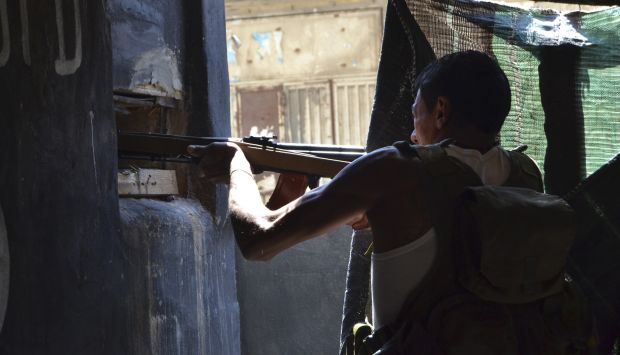
A Sunni Muslim gunman takes his position as he fires his weapon in the Sunni Muslim Bab Al-Tabbaneh neighborhood in Tripoli, northern Lebanon, on March 21, 2014. (Reuters)
Beirut, Asharq Al-Awsat—At least 22 people were killed and over 157 injured on Friday as clashes continued between Sunni and Shi’ite militias in the Lebanese city of Tripoli, 53 miles (85 kilometers) north of Beirut. The latest fighting represents the most recent spillover from the ongoing conflict in Syria.
With no signs of an end to the violence in sight, one of Lebanon’s poorest cities has come to a standstill, with residents remaining indoors and businesses, schools and universities shut.
Speaking to Asharq Al-Awsat, former Future Movement MP for Tripoli Mustafa Alloush said: “There are no signs of any initiative or efforts being made to stop the fighting. On the contrary, it seems pretty obvious that things are out of the control of the region’s leaders and in the hands of those sponsoring the violence by providing fighters with money and weapons.”
“Those saying decision-making is in the Lebanese politicians’ hands are delusional,” he said. Alloush also noted that although the conflict in Syria has served as a catalyst for violence across the border, the situation in Tripoli is “not solely connected with the Syrian crisis, as the violence dates back to 2008.”
Asked about the reasons behind the Tripoli clashes, Alloush pointed to “Hezbollah’s illegal weapons in Jabal Mohsen and Bab Al-Tabbaneh.”
“The Lebanese army and security forces are needed to wrest control of Jabal Mohsen and confront those inciting the violence, regardless of which side is responsible,” he told Asharq Al-Awsat.
In a statement on Friday, the Lebanese military confirmed that four soldiers were injured in Tripoli. A roadside bomb in the Al-Bahsas district was detonated near a military vehicle patrolling the area. No deaths were reported.
Tripoli’s Sunni majority, who back the Syrian rebels against President Basharq Al-Assad’s regime, and Shi’ite minority, who are mainly supportive of Assad, have been locked in a bitter sectarian conflict since the Syrian crisis erupted.
With the increased involvement of Lebanon’s Shi’ite Hezbollah in the Syrian war, Tripoli has seen an upsurge in sectarian violence since 2012.
